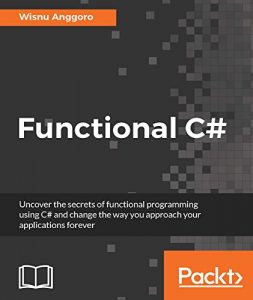Key Features
- This book focuses on the functional paradigm of C#, which will give you a whole new angle on coding with C#
- It illustrates the advantages that functional programming brings to the table and the associated coding benefits
- This practical guide covers all the aspects of functional programming and provides solutions that can be applied in business scenarios
Book Description
Functional programming makes your application faster, improves performance, and increases your productivity. C# code is written at a higher level of abstraction, so that code will be closer to business requirements, abstracting away many low-level implementation details.
This book bridges the language gap for C# developers by showing you how to create and consume functional constructs in C#. We also bridge the domain gap by showing how functional constructs can be applied in business scenarios. We'll take you through lambda expressions and extension methods, and help you develop a deep understanding of the concepts and practices of LINQ and recursion in C#.
By the end of the book, you will be able to write code using the best approach and will be able to perform unit testing in functional programming, changing how you write your applications and revolutionizing your projects.
What you will learn
- Develop an application using the functional approach
- Implement unit testing to functionally program code
- Create efficient code using functional programming
- Work through a LINQ query so you can work with data
- Compose asynchronous programs to create a responsive application
- Use recursion in function programming in order to simplify code
- Optimize the program code using Laziness and Caching Techniques
About the Author
Wisnu Anggoro is a Microsoft Certified Professional in C# programming and an experienced C/C++ developer. He has also authored Boost.Asio C++ Network Programming - Second Edition, published by Packt. He has been programming since he was in junior high school (about 20 years ago) and started developing computer applications using the BASIC programming language in the MS-DOS environment. He has a solid experience of smart card programming as well as desktop and web application programming, such as designing, developing, and supporting live use applications for SIM Card Operating System Porting, personalization, PC/SC communication, and other smart card applications that require the use of C# and C/C++. He is currently a senior smart card software engineer at CIPTA, an Indonesian company that specializes in the innovation and technology of smart cards. You can write to him at wisnu@anggoro.net.
Table of Contents
- Tasting Functional Style in C#
- Walkthrough Delegates
- Expressing Anonymous Methods with Lambda Expressions
- Extending Object Functionality with Extension Methods
- Querying Any Collection Easily with LINQ
- Enhancing the Responsiveness of the Functional Program with Asynchronous Programming
- Learning Recursion
- Optimizing the Code using Laziness and Caching Techniques
- Working with Pattern
- Taking an Action in C# Functional Programming
- Coding Best Practice and Testing the Functional Code






